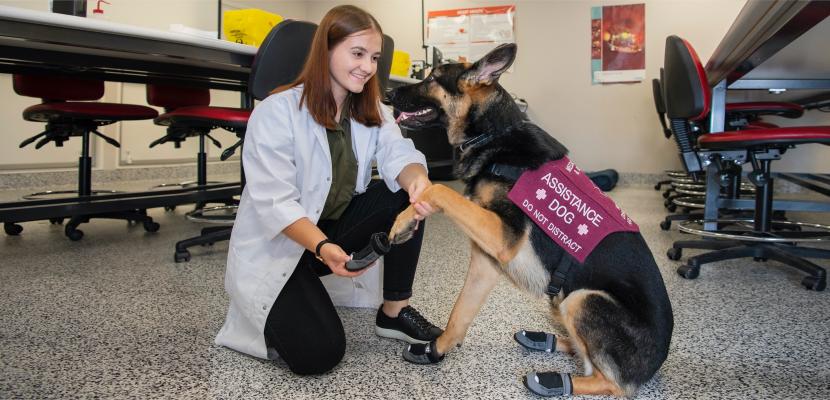
When Kate Majdanik eventually graduates from Bond University, she hopes to have a furry companion by her side as she crosses the stage.
It only seems fitting as Joy, her german shepherd assistance dog, has been with her every step of the way on her university journey.
Ms Majdanik is in her first year of a Bachelor of Biomedical Science, and hopes to eventually study Medicine.
Born in Poland, she came to Australia in 2019 for an English language course, but loved the country so much she decided to stay.
Shortly after arriving in Australia, Ms Majdanik was diagnosed with multiple health issues, the most serious of which was a neurological condition.
“My doctor suggested an assistance dog was something I could benefit from.
“Assistance dogs for neurological conditions are trained to recognise changes in the smell of your saliva, and they can alert an individual based on those changes.
“The person can take medication before an episode happens, before they even know something is going on.
“Some dogs will bark. What Joy does is, she comes up to me, she puts her nose against my knee and nudges it repeatedly. It’s a very specific action that she does not do in any other circumstance,” Ms Majdanik said.
Ms Majdanik has had Joy since the puppy was just eight weeks old.
The two have a strong connection, but having Joy at her side constantly has meant Ms Majdanik often has to field comments from well-meaning strangers.
“Because Joy is a german shepherd we do face some comments or stereotypes about the breed. Lots of people presume she’s a police dog, or a guard dog, or an army dog.
“I usually make a joke out of the situation – she doesn’t even know how to bark, but she could lick you to death. Then, I explain that she is an assistance dog and what that means.”
Another challenge is people wanting to pat Joy, who wears a vest advising that she is an assistance dog.
“Assistance dogs are trained to understand the difference between having the gear on, when they are working, and being ‘off-duty’ without anything on their back. The vest means they are supposed to ignore other people and it’s crucial that the public do not distract them. If an assistance dog gets distracted by strangers patting them, it can have a detrimental effect on their handler’s health,” Ms Majdanik said.
Ms Majdanik was the first student in Bond University’s Faculty of Health Sciences & Medicine to need an assistance dog, which meant precautions had to be taken to allow Joy to go with her into the laboratories.
“It was decided if a human needed to wear shoes, Joy would need to wear shoes as well. So, she has little doggy shoes that she wears in the lab to protect her feet from anything which may be on the floor.
“Joy also has a dog bed to lie on in the lab, so there’s no risk of her lying on the floor where there might be glass, and there’s no risk of anything falling on her.”
As Joy becomes a more common sight around Bond University’s campus, Ms Majdanik hopes people will gain a greater understanding of her role.
“Joy and the job she does is described differently by different people, and the terms they use are not always accurate. Although used with good intentions, we should avoid terms like ‘emotional support animal’, ‘support pet’, or ‘therapy dog’ to describe the work assistance dogs do, as these terms are not accurate and can lead to misunderstanding of the purpose of these dogs.”
Ms Majdanik said dogs of all breeds and sizes could be trained to be assistance dogs, depending on what tasks they needed to perform.

